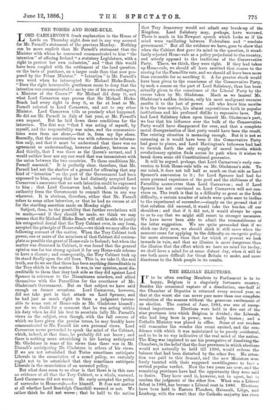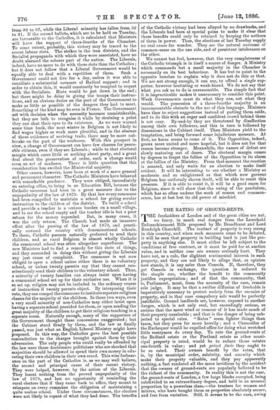THE BELGIAN ELECTIONS.
IF to be often sending Members to Parliament is to be happy, Belgium is a singularly fortunate country. Besides the occasional rapture of a dissolution, one-half of the Chamber of Deputies is returned every second year, .so that at the worst she can never pass more than one complete revolution of the seasons without the generous excitement of an election. The contest of June, 1884, was one of excep- tional importance. Elections were held in five out of the nine provinces into which Belgium is divided ; the Liberals, who had long been in power, were badly beaten ; and a Catholic Ministry was placed in office. Some of our readers will remember the wonder this event excited, and the con- fidence with which it was maintained to be purely accidental, and to be in no way indicative of the real mind of the nation. The King was implored to use his prerogative of dissolving-the Chambers, in the belief that the four provinces in which elections would not naturally be held till 1886, would redress the balance that had been disturbed by the other five. No atten- tion was paid to this demand, and the new Ministers were freely taunted with their supposed unwillingness to face a revised popular verdict. Now the two years are over, and the remaining provinces have had the opportunity they were said to desire. They have used it, however, not to upset, but to confirm the judgment of the other five. What was a Liberal defeat in 1884, has become a Liberal rout in 1886. Elections have been held in Eastern Flanders, 'Hainault, Liege, and Limburg, with the result that the Cage:tile majority has risen.
from 86 to 97, while the Liberal minority has fallen from 52 to 41. If the second ballots, which are to be held on Tuesday, are favourable to the Catholics, it is calculated that Ministers will have the support of three-fourths of the Chamber. To some extent, probably, this victory may be traced to the recent labour riots. The strikes in the iron districts, and the Socialist propaganda with which they were associated, have no doubt alarmed the soberer part of the nation. The Liberals, indeed, have no more to do with these riots than the Catholics ; but it does not follow that a Liberal Government would be equally able to deal with a repetition of them. Such a Government could not live for a day, unless it was able to conciliate a substantial measure of Radical support ; and in order to obtain this, it would constantly be tempted to coquet with the Socialists. Riots would be put down in the end ; but there might be delay in giving the troops their instruc- tions, and an obvious desire on the part of the Government to make as little as possible of the dangers they had to meet. Something of the kind may be seen in France. The Government act with decision when the necessity becomes unmistakeable, but they are loth to recognise it while by straining a point they can shut their eyes to its existence. As we were warned some time back, the next winter in Belgium is not likely to find wages higher or work more plentiful, and in the absence of these evidences of reviving trade, there may be more out- breaks on the part of the workmen. With this prospect in view, a change of Government can have few charms for peace- able citizens, even if they are Liberals ; while to that electoral margin which cares little or nothing about party, and a great deal about the preservation of order, such a change would seem an act of madness. There is little question that this consideration has swelled the Ministerial majority.
Other causes, however, have been at work of a more general and permanent character. The Catholic Ministers have behaved with remarkable prudence. They were obliged, immediately on entering office, to bring in an Education Bill, because the Catholic successes had been in a great measure due to the unpopularity of the law of 1879. By that law every commune had been compelled to maintain a school for giving secular instruction to the children of the district. To build a school and provide a teacher is a serious burden on a small village, and to see the school empty and the teacher idle is but a poor return for the money expended. But, in many cases, it was the only return. The Church had made an immense effort after the passing of the law of 1879, and practi- cally covered the country with denominational schools. To these, Catholic parents naturally preferred to send their children, and as rural Belgium is almost wholly Catholic the communal school was often altogether superfluous. The new Ministers had to find a remedy for this state of things, and they succeeded in doing this without giving the Liberals any just cause of complaint. The commune is not now obliged to open a school unless either there is no voluntary school, or unless twenty parents say that they cannot con- scientiously send their children to the voluntary school. Thus, a minority of twenty families can always insist upon having a communal school set up for their exclusive use. When it is so set up, religion may not be included in the ordinary course of instruction if twenty parents object. By interposing their veto, they can compel the commune to institute separate religious classes for the majority of the children. In these two ways, even a very small minority of non-Catholics may either insist upon having a separate school provided for them, or upon sending the great majority of the children to get their religious teaching in a separate room. Naturally enough, many of the supporters of the Government thought these concessions exaggerated ; but the Cabinet stood firmly by them, and the law as finally passed, was just what an English Liberal Ministry might have proposed. In this way, the Catholics gave the best possible contradiction to the charges brought against them by their adversaries. The only people who could really be offended by the law were those doctrinaire politicians who are shocked that majorities should be allowed to spend their own money in edu- cating their own children in their own creed. This wise forbear- ance on the part of the Catholics is, as we may well believe, the second and principal cause of their recent victory. They were helped, however, by the action of the Liberals. They learnt nothing from the proved unpopularity of the law of 1879, and lost no opportunity of reminding the rural electors that if they came back to office, they meant to reimpose on every commune the obligation of maintaining a quite useless school. Under these circumstances, the electors were not likely to repent of what they had done. The benefits of the Catholic victory had been alloyed by no drawbacks, and the Liberals had been at special pains to make it clear that these benefits could only be retained by keeping the authors of them in power. Thus, the elections of last Tuesday supply no real cause for wonder. They are the natural outcome of common-sense on the one side, and of persistent intolerance on the other.
We cannot but feel, however, that the very completeness of the Catholic triumph is in itself a source of danger. A Ministry which commands but a small majority in the Chamber is necessarily on its best behaviour. It has but to point to the opposite benches to explain why it does not do this or that. We are not strong enough, it can say, to offend a single sup- porter, however hesitating or weak-kneed. We do not say that what you ask us to do is unreasonable. The simple fact that it is impracticable makes it unnecessary to consider this point. Weak Governments must do what they can, not what they would. The possession of a three-fourths majority is an insurmountable obstacle to the use of this language. Ministers have then to reject suggestions instead of putting them aside, and to do this with an eager and confident crowd behind them is not easy. By-and-by they are threatened by disaffection among their own followers, and this in turn is followed by dissensions in the Cabinet itself. Then Ministers yield to the temptation, and bring forward some injudicious measure. At first, no harm seems to come of it. The Opposition, indeed, grows more united and more hopeful, but it does not for that reason become stronger. Meanwhile, the causes of defeat are slowly maturing out of doors. The electoral margin comes by degrees to forget the follies of the Opposition in its alarm at the follies of the Ministry. From that moment the reaction is assured, and only waits for an election to make itself evident. It will be interesting to see whether a Ministry so moderate and so enlightened as that which now governs Belgium has uniformly shown itself, will be able to resist this pressure. If it is able to resist it, it will be a good omen for Belgium, since it will show that the swing of the pendulum, which has so often undone the work of reason and common- sense, has at last lost its old power of mischief.



































 Previous page
Previous page